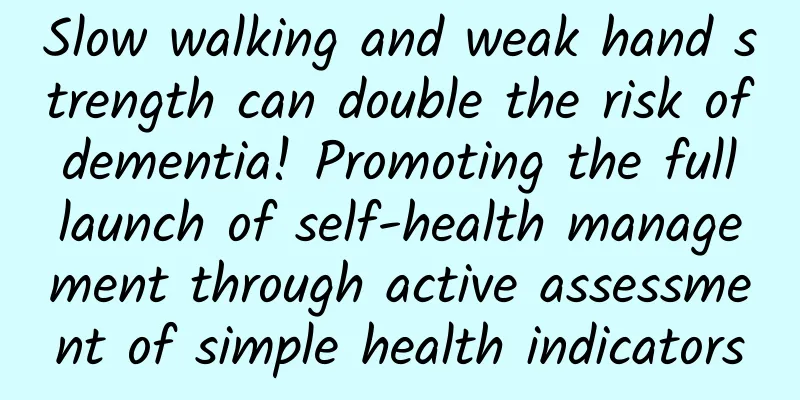Slow walking and weak hand strength can double the risk of dementia! Promoting the full launch of self-health management through active assessment of simple health indicators

|
Walking is the most common daily behavior and a simple and effective way of exercise, which is closely related to human health. Recently, Dr. He Panpan and others from Professor Qin Xianhui's team at the National Clinical Research Center for Kidney Diseases of Nanfang Hospital of Southern Medical University published a research paper in the biomedical journal Alzheimer's Research & Therapy, showing that faster walking speed is associated with a lower risk of dementia. The study included nearly 500,000 adult participants from the UK Biobank study with an average age of 56.5 years. Among them, 40,464 participants (8.2%) reported a slow walking speed, 261,751 participants (52.8%) reported a normal walking speed, and 193,485 participants (39.0%) reported a fast walking speed. After 12 years of follow-up, 3986 (0.8%) participants developed dementia. Compared with participants who reported a slower walking speed, participants with an average or faster walking speed had a significantly lower risk of new-onset total dementia by 39% and 41%, a lower risk of new-onset Alzheimer's disease by 36% and 36%, and a lower risk of new-onset vascular dementia by 46% and 53%, respectively. In addition, age and APOE ε4 genotype significantly modified this association, and this inverse association was significantly attenuated in participants who carried two APOE-ε4 genes or were older (Figure 1). Figure 1 The inverse association between gait speed and dementia risk is attenuated in people who carry two APOE-ε4 genes or are older At the same time, grip strength, as an important indicator of muscle health, is also significantly correlated with dementia risk; the stronger the grip, the lower the risk of dementia, and the two are significantly continuous and linearly negatively correlated. The results show that compared with people who walk slowly and have weak grip, people who maintain a faster walking speed and stronger grip have a significantly lower risk of dementia by 55%. The results of this study emphasize the importance of comprehensive assessment of physical function, genetic characteristics, and age to identify dementia risk and improve dementia risk stratification. Most importantly, the general population should actively pay attention to their own health status through the assessment of simple health indicators such as grip strength and walking speed, which will be the only way to promote their initiation of self-health management and achieve active health! References: He P, Zhou C, Ye Z, Liu M, Zhang Y, Wu Q, Zhang Y, Yang S, Xiaoqin G, Qin X. Walking pace, handgrip strength, age, APOE genotypes, and new-onset dementia: the UK Biobank prospective cohort study. Alzheimers Res Ther. 2023 Jan 9;15(1):9. doi: 10.1186/s13195-022-01158-6. PMID: 36624486; PMCID: PMC9827642. Editor | He Panpangan Xiaoqin Audit | Qin Xianhui Reprint: Please contact us and indicate the source. |
<<: Fighting monsters with asthmatic babies at home
Recommend
Red and painful pimples on chin
Women will have a few days of irritability every ...
Is there an acquired cause for uterine septate?
Uterine septum is caused by congenital abnormalit...
Can I eat corn after IVF?
Corn is a relatively common food and its nutritio...
How to supplement calcium for women during menopause?
Menopause is a stage that many female friends hav...
I am afraid of side effects when taking medicine, but I am afraid of death when not taking medicine? How to correctly view adverse drug reactions
The following article comes from Cui Songshuo, th...
What causes vaginal bleeding after running?
Compared with men, women have more things to pay ...
Do birth control pills cause delayed periods?
If women want to take emergency contraception, th...
Is breast augmentation useful after childbirth? The simplest breast enlargement treatment
The breasts of mothers who have just given birth ...
How to maintain a woman after 40
When a woman reaches the age of 40, she should pa...
What to do if your gums are swollen during the confinement period
If your gums are swollen and painful, it means yo...
Which acupoints should be massaged for dysmenorrhea
Many women have experienced dysmenorrhea. This fe...
Chronic ankle pain in adolescents cannot be diagnosed? Beware of tarsal fusion!
Author: Mo Yueqiang, attending physician, Childre...
My period is not coming and there is no more leucorrhea
Menstruation is actually what we usually call the...
How to fade acne marks
Many beginners don’t know much about the skin smo...









